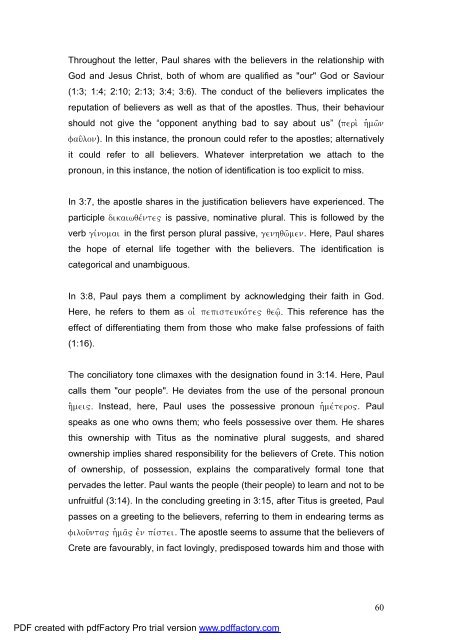A Text centred rhetorical analysis of Paul's Letter to Titus
A Text centred rhetorical analysis of Paul's Letter to Titus
A Text centred rhetorical analysis of Paul's Letter to Titus
Create successful ePaper yourself
Turn your PDF publications into a flip-book with our unique Google optimized e-Paper software.
Throughout the letter, Paul shares with the believers in the relationship with<br />
God and Jesus Christ, both <strong>of</strong> whom are qualified as "our" God or Saviour<br />
(1:3; 1:4; 2:10; 2:13; 3:4; 3:6). The conduct <strong>of</strong> the believers implicates the<br />
reputation <strong>of</strong> believers as well as that <strong>of</strong> the apostles. Thus, their behaviour<br />
should not give the “opponent anything bad <strong>to</strong> say about us” (peri; hJmw`n<br />
fau`lon). In this instance, the pronoun could refer <strong>to</strong> the apostles; alternatively<br />
it could refer <strong>to</strong> all believers. Whatever interpretation we attach <strong>to</strong> the<br />
pronoun, in this instance, the notion <strong>of</strong> identification is <strong>to</strong>o explicit <strong>to</strong> miss.<br />
In 3:7, the apostle shares in the justification believers have experienced. The<br />
participle dikaiwqevnte" is passive, nominative plural. This is followed by the<br />
verb givnomai in the first person plural passive, genhqw`men. Here, Paul shares<br />
the hope <strong>of</strong> eternal life <strong>to</strong>gether with the believers. The identification is<br />
categorical and unambiguous.<br />
In 3:8, Paul pays them a compliment by acknowledging their faith in God.<br />
Here, he refers <strong>to</strong> them as oiJ pepisteukovte" qew`/. This reference has the<br />
effect <strong>of</strong> differentiating them from those who make false pr<strong>of</strong>essions <strong>of</strong> faith<br />
(1:16).<br />
The concilia<strong>to</strong>ry <strong>to</strong>ne climaxes with the designation found in 3:14. Here, Paul<br />
calls them "our people". He deviates from the use <strong>of</strong> the personal pronoun<br />
h}mei". Instead, here, Paul uses the possessive pronoun hJmevtero". Paul<br />
speaks as one who owns them; who feels possessive over them. He shares<br />
this ownership with <strong>Titus</strong> as the nominative plural suggests, and shared<br />
ownership implies shared responsibility for the believers <strong>of</strong> Crete. This notion<br />
<strong>of</strong> ownership, <strong>of</strong> possession, explains the comparatively formal <strong>to</strong>ne that<br />
pervades the letter. Paul wants the people (their people) <strong>to</strong> learn and not <strong>to</strong> be<br />
unfruitful (3:14). In the concluding greeting in 3:15, after <strong>Titus</strong> is greeted, Paul<br />
passes on a greeting <strong>to</strong> the believers, referring <strong>to</strong> them in endearing terms as<br />
filou`nta" hJma`" ejn pivstei. The apostle seems <strong>to</strong> assume that the believers <strong>of</strong><br />
Crete are favourably, in fact lovingly, predisposed <strong>to</strong>wards him and those with<br />
PDF created with pdfFac<strong>to</strong>ry Pro trial version www.pdffac<strong>to</strong>ry.com<br />
60

















